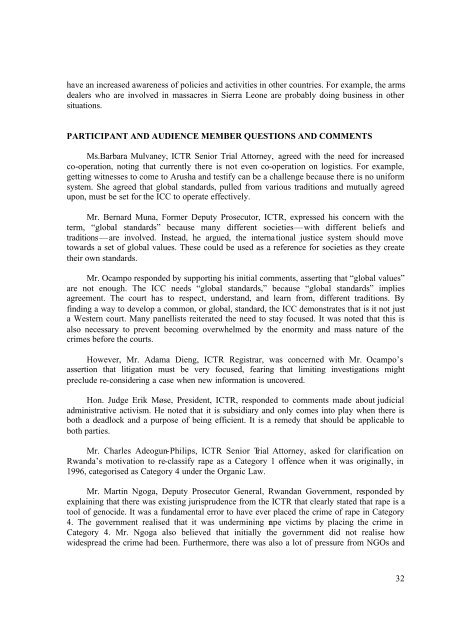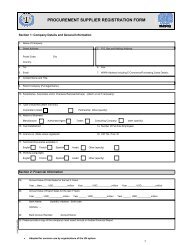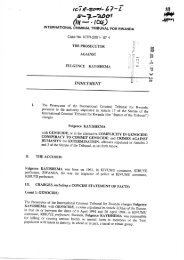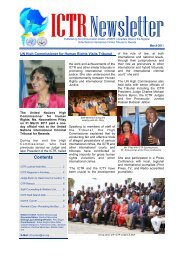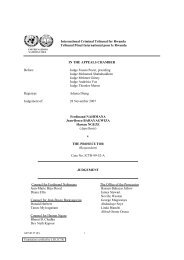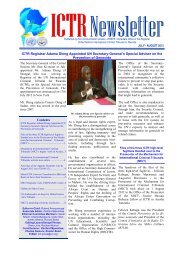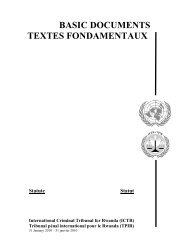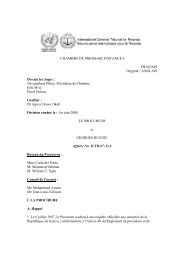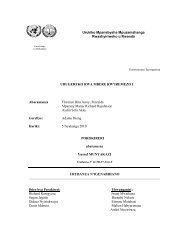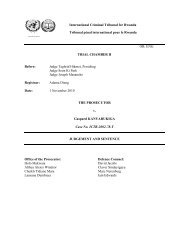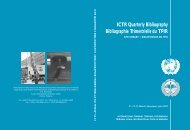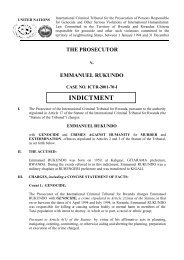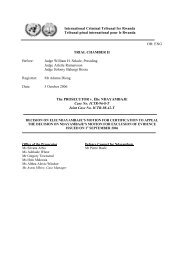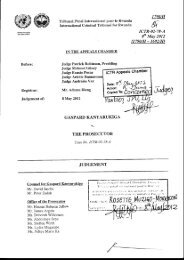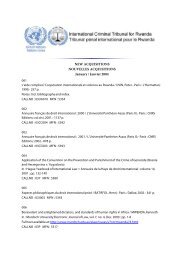Report of Proceedings - International Criminal Tribunal for Rwanda
Report of Proceedings - International Criminal Tribunal for Rwanda
Report of Proceedings - International Criminal Tribunal for Rwanda
Create successful ePaper yourself
Turn your PDF publications into a flip-book with our unique Google optimized e-Paper software.
have an increased awareness <strong>of</strong> policies and activities in other countries. For example, the arms<br />
dealers who are involved in massacres in Sierra Leone are probably doing business in other<br />
situations.<br />
PARTICIPANT AND AUDIENCE MEMBER QUESTIONS AND COMMENTS<br />
Ms.Barbara Mulvaney, ICTR Senior Trial Attorney, agreed with the need <strong>for</strong> increased<br />
co-operation, noting that currently there is not even co-operation on logistics. For example,<br />
getting witnesses to come to Arusha and testify can be a challenge because there is no uni<strong>for</strong>m<br />
system. She agreed that global standards, pulled from various traditions and mutually agreed<br />
upon, must be set <strong>for</strong> the ICC to operate effectively.<br />
Mr. Bernard Muna, Former Deputy Prosecutor, ICTR, expressed his concern with the<br />
term, “global standards” because many different societies—with different beliefs and<br />
traditions—are involved. Instead, he argued, the international justice system should move<br />
towards a set <strong>of</strong> global values. These could be used as a reference <strong>for</strong> societies as they create<br />
their own standards.<br />
Mr. Ocampo responded by supporting his initial comments, asserting that “global values”<br />
are not enough. The ICC needs “global standards,” because “global standards” implies<br />
agreement. The court has to respect, understand, and learn from, different traditions. By<br />
finding a way to develop a common, or global, standard, the ICC demonstrates that is it not just<br />
a Western court. Many panellists reiterated the need to stay focused. It was noted that this is<br />
also necessary to prevent becoming overwhelmed by the enormity and mass nature <strong>of</strong> the<br />
crimes be<strong>for</strong>e the courts.<br />
However, Mr. Adama Dieng, ICTR Registrar, was concerned with Mr. Ocampo’s<br />
assertion that litigation must be very focused, fearing that limiting investigations might<br />
preclude re-considering a case when new in<strong>for</strong>mation is uncovered.<br />
Hon. Judge Erik Møse, President, ICTR, responded to comments made about judicial<br />
administrative activism. He noted that it is subsidiary and only comes into play when there is<br />
both a deadlock and a purpose <strong>of</strong> being efficient. It is a remedy that should be applicable to<br />
both parties.<br />
Mr. Charles Adeogun-Philips, ICTR Senior Trial Attorney, asked <strong>for</strong> clarification on<br />
<strong>Rwanda</strong>’s motivation to re-classify rape as a Category 1 <strong>of</strong>fence when it was originally, in<br />
1996, categorised as Category 4 under the Organic Law.<br />
Mr. Martin Ngoga, Deputy Prosecutor General, <strong>Rwanda</strong>n Government, responded by<br />
explaining that there was existing jurisprudence from the ICTR that clearly stated that rape is a<br />
tool <strong>of</strong> genocide. It was a fundamental error to have ever placed the crime <strong>of</strong> rape in Category<br />
4. The government realised that it was undermining rape victims by placing the crime in<br />
Category 4. Mr. Ngoga also believed that initially the government did not realise how<br />
widespread the crime had been. Furthermore, there was also a lot <strong>of</strong> pressure from NGOs and<br />
32


